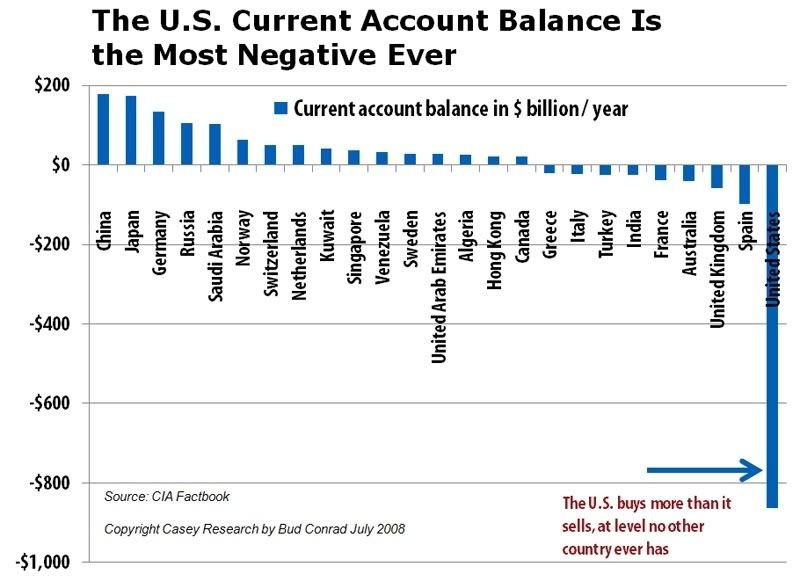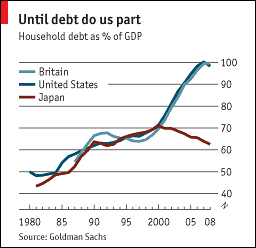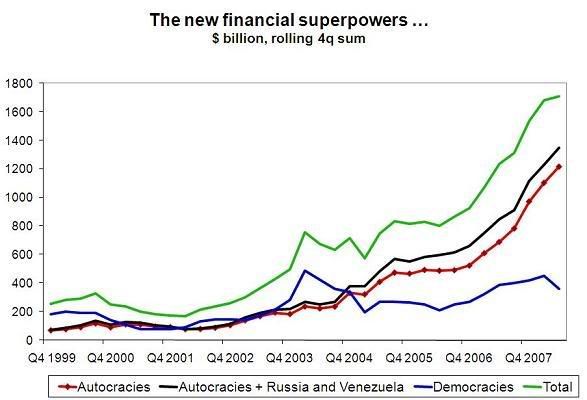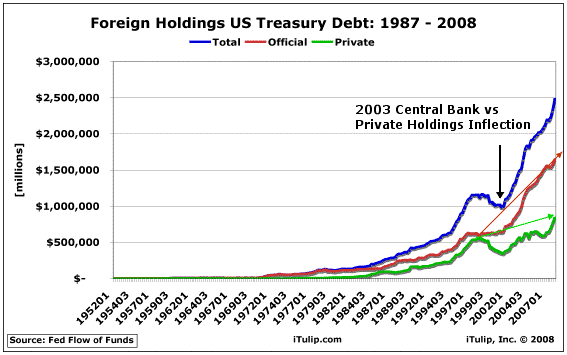To maintain an empire what you need above all else is money. Lots and lots of money. A victorious army in the field is useless without the wealth behind it.
A good example of this is the Suez Crisis of 1956, which marked the end to the British Empire.
America is following in Britain's footsteps.

Britain's attempt to strong-arm Egypt had indirectly caused a nationalist backlash and Gamal Abdul Nasser's rise to power. When Nasser nationalized the Suez Canal, Israel, France, and Britain invaded and quickly routed the Egyptian army.
But they had forgotten to do one thing - clear it with America.
Eisenhower was afraid the middle east would embrace the Soviet Union. But what could America do to stop it from the other side of the world? Plenty, as it turned out.
When the U.S. tried to pass a resolution through the U.N. Security Council that condemned the invasion, France and Britain vetoed it. So Ike took a different tactic.
Eisenhower threatened to sell the British Pounds that were sitting in America's currency reserves. What's more, he blocked attempts by Britain to withdraw their funds from the IMF.
The markets reacted by dumping Pounds as fast as they could. Suddenly Britain had a full-scale currency crisis. Chancellor of the Exchequer Maurice Harold Macmillan described it as a "catastrophe affecting not merely the British cost of living but also all our external economic relations."
Within two weeks the British were withdrawing troops from Egypt. But that wasn't enough.
Britain had to cave into America so completely that relations with America didn't return to normal until Prime Minister Sir Anthony Eden agreed to step down. In other words, we caused a regime change in our allie's government without even threatening to fire a single shot. Britain had been humbled.
History Rhymes
Which brings us to America's situation today.

Like Britain, America has its own middle east military adventure that wasn't cleared with our creditors.
Like Britain in 1956, America no longer has the economy to support an empire, but still acts like it does. America gets away with pretending it is independent only as long as our creditors allow the game to continue.
But our creditors are starting to get nervous.
Seeking to head off any unloading of Fannie Mae and Freddie Mac bonds by Japanese investors, the U.S. Treasury Department is taking the unusual step of directly contacting Japanese financial institutions about the plan to rescue the mortgage giants, according to a published report.The Treasury Department had reason to be worried. Foreigners were selling Fannie and Freddie debt in big lumps, and they have about $1.5 Trillion that they could sell (assuming that anyone would want to buy it).

The Japanese weren't the only ones who had a say in our domestic financial policy. The bailout of Fannie and Freddie, the largest in history, only happened because China insisted.
Investors in Asia, the biggest foreign owners of Fannie Mae's $3 trillion of bonds, were asking the Treasury to bolster the government- sponsored company and its smaller competitor, Freddie Mac, said three people with knowledge of the talks.Paulson had visited China just a few months earlier and failed to win any concessions from China concerning their currency practices. He also caved in to China last December.
The next afternoon, before financial markets opened Monday in Asia, Paulson announced the rescue plan, saying he would seek authority to buy unlimited equity stakes in the companies and their bonds if needed, while the Federal Reserve would lend directly to Fannie and Freddie.

The reason I point this out is because Paulson met with the Chinese President just two weeks after the Bear Stearns collapse.
A month later Paulson was on his way to the middle east.
United States Treasury Secretary Henry Paulson will fly to the UAE and other Gulf states this week to reassure regional governments on their funds in the US following recent furore about the role of their investments.A few decades ago you wouldn't picture the Treasury Secretary's role to be a world traveler. But times have changed. Now the Treasury Secretary's main job is to reassure our foreign creditors, without which the American economy would grind to a halt.
To a large extent, what the Treasury Department has become is an agency to sell American debt to foreigners.

To fully appreciate how far America has fallen, take a look at this.
"We need to show greater humility in the world," former U.S. Treasury Undersecretary Tim Adams said in an interview at a conference in Charlottesville, Virginia.Hubris doesn't fit well on beggars, which is what we've become. Humility is the trait of beggars, and one we should become more familiar with. Especially since we're going to need to borrow a lot more in the coming years.
"Reciprocity is important," said Watanabe, who was in charge of Japan's currency policy and its purchases of foreign- exchange reserves from 2004 to 2007. "It's also important for the U.S. to set a good example, and to realize it cannot survive independently. They need to show more sincerity."
"Humility is not a word one associates with the U.S.," he said. "Usually it's hubris."
Bloomberg (Shamim Adam): “The U.S. may post a $565 billion budget deficit next year, and risks of an even wider shortfall are on the ``high side'' amid the possibility of more economic stimulus packages and rescues of financial institutions, Goldman Sachs Group Inc. said. The estimate is $100 billion more than Goldman's previous prediction for the year starting Oct. 1 and exceeds the Congressional Budget Office's forecast for a $438 billion shortfall, Edward McKelvey and Alec Phillips wrote in a note published yesterday. The deficit will be about $560 billion in 2010, the report said.America is already at the point where foreigners have a direct say in our domestic policies. If our borrowing must increase, what's to stop them from having a direct say in our foreign policies as well? What's to stop them from doing to us what we did to Britain in 1956? In fact that is exactly what many expect.
[...]
MarketNew International (John Shaw): “Congressional Budget Office Director Peter Orszag said... that if all of President Bush’s 2001 and 2003 tax cuts are extended and the alternative minimum tax is patched each year as well as maintaining current levels of federal spending, the U.S. could generate more than $7 trillion in cumulative deficits over the next decade.
The longer the United States relies on international central banks and sovereign funds to support large external deficits, the greater the risk the economy's need for external credit will constrain the government's policy options, the report said.
It also warns that countries that do not share U.S. political values and policy goals could use large holdings of U.S. assets as political and economic leverage.
Labels: midtowng
Hi Jeremy,
The EU is capable in terms of economic resources but lacking in political will or effective governmental structures. Outlier decades represent a demographic crisis of shrinking population in their most economically vital states: key question for the EU future - admit Muslim states? ( Turkey, Azeribaijan, Mediterranean littoral, Free Kurdistan[?])That's the largest strategic question for their future, in my view.
China is a question mark. Enormous potential, tremendous advances huge structural social problems.Can Beijing continue to ride the tiger for four more decades without a major social upheval ? The ppl in DoD in the "big War" crowd who see China as a "near-peer" competitor are largely projecting a "Soviet" global role onto China that the Chinese aren't seeking. Not that they are "nice" guys but the CCP is terrified of centrifugal disintegration at home.
Ahistoricality on 9/14/2008 9:25 AM:
Well, there's always the UN!
[ducks and covers]
Seriously, though, the fact that there's nobody to replace us isn't historically relevant: empires don't die on a schedule and they don't get to pick their successors. The world will muddle along, or it won't, but there's no rule that says a hegemon is necessary.
We're more likely to become mercenaries in the long run, as the transition from regular military to BlackWater, inc. continues.
midtowng on 9/14/2008 11:44 AM:
I think you are partially missing the point Mark, and you underestimate our creditors.
First of all, we are a "hegemon" in name only now. Like a puppet on a string, we will dance for our creditors when they want us to.
With that in mind, do you really think that, say, Russia would want China more in control of us than them? It becomes a dangerous game to allow America too much power that can be controlled by someone else. It's far better to have America knocked down in stature.
What our competitors in the world want is for us to shrink in size slowly, so as not to upset the current status quo. But shrink we will.
Secondly, nation's like China and Russia are more than willing to fill the void we leave. They just are interested in the entire world (as we are). Policing the entire world is expensive, and they are learning from our lesson.
As I understood the Neocons plan prior to the break up of the Soviet Union the world would have been divided up into large geographical trading regions. Yet these plans inauguration stemmed from the previous great depression of the late 1920’s and have reached their complete manifestations presently. The emphasis of this plan was based on secured geographical trading regions in which China and the EU have secured their spheres of influence and the United States has failed to accomplish their nearly completed region. Specifically South America has realized that they may have more to bring to the table now and the United States squandered their advantage since 12/12/2000 in that region. China, EU, and Russia are cutting deep into South America this disaster is going unnoticed presently by the failed oil heist, credit crisis, and total mismanagement. Leaving the only option left that, is let the entire world economy go into free fall and leaving the large oil companies that have the finical liquidity to scoop up the cream for pennies on the dollar. Then reset the game
Hi Ahistoricality,
You would enjoy both Martin van Creveld's work as well as Chet Richards _Neither Shall the Sword_.
http://www.amazon.com/Neither-Shall-Sword-Conflict-Years/dp/193201926X
Hi Midtowing,
You underestimate the extent to which China has married its economy to that of the United States ( and most Americans don't realize that it runs both ways). They staked their strategic currency reserves on the dollar and their export driven economic growth is dependent on exports to the U.S. ( Walmart by itself is China's 4th largest trading partner). There is no short-term de-coupling for either party and no way to "punish" the other without suffering in turn.
Russia is economically insignificant in this discussion. Russian behavior today reflects a catch-up strategy to try to hedge against a grim future. well, maybe but the odds for Moscow are very long.







A few brief comments:
Britain's empire was mortally wounded by WWI and any potential for revival was heroically sacrificed by throwing everything into resisting Hitler. The Suez was simply making a long existing fact public.
The economic aspect you identify is crucial but it is also a relative variable. Great Britain continued as a global empire after WWI not on it's own intrinsic strength per se but due to a lack of rivals who were willing or able to fill the vacuum in 1919. After WWII, both the US and the USSR were able to eclipse Britain and France relatively effortlessly.
No power or association of powers is willing or able to step into the shoes of the U.S. Nor are they willing, as they are currently free-riding on some aspects of the international security system that they benefit from as status quo powers, to have America vacate that role.
Even less willing are they to see some geographically close great power rival someday *replace* the U.S. as a "hegemon"